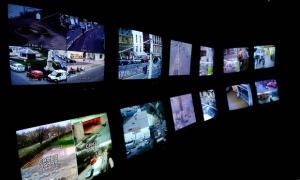One Idea To Best The Surveillance State: Radical Transparency
February 25, 2016

UMD art professor Hasan Elahi wrote an article in The Guardian in response to the court order to make Apple unlock a shooter's iPhone.
Hasan Elahi, The Guardian
Photo courtesy of Alamy
I’m convinced that government surveillance will not go away regardless of how much we may object to it – we’re too far in to get out. The court order to make Apple unlock a shooter’s iPhone is just the tip of the iceberg; myriad technologies collect the data of our daily lives, and avoiding this would be not only inconvenient but also out of sync with the times we live in.
Algorithms are only getting smarter, and online movements easier to track. So it’s time for a paradigm shift: going forward, the best way to restore privacy will be to give it up and instead embrace total transparency. We must stop thinking of surveillance (derived from the French verb surveiller, “to watch over”) as something that can only be used against us and instead embrace it as a tool forsousveillance (watching from below) – that is, watching the watchers.
As recently as the early aughts, it might have been possible to avoid surveillance cameras, but that’s no longer the case. Amazon knows what we want to buy before we know it ourselves. Target knows pregnant teenagers better than their parents do. As difficult as it may be to accept, we need to adapt to this new reality and figure out how to live within it.
Total transparency might seem like a drastic measure, but it isn’t such a harebrained idea. For the past 14 years I’ve been tracking myself in the name of national – and personal – security, and I recommend that everyone take this up. Instead of fearing surveillance, I’ve embraced it; I’ve protected myself from unwanted government scrutiny by making my entire life and whereabouts publicly accessible. There’s a strange sense of security in knowing that at any moment there are thousands of eyes on me, and if I were to disappear, at least a few would know that something was wrong.
In his 1998 nonfiction book The Transparent Society, science fiction writer David Brin described two parallel cities under surveillance. Everything is monitored in both cities, but in “city number one” all the information goes to the police, and in “city number two” the information is broadcast to everyone. It’s an eerie premonition of our options today. We are already living in city number one – data is collected and used in ways that the average person is unaware of or understands only vaguely.
It’s not a question of whether this situation makes things better or worse than they were before – the fact is that our fundamental definition of privacy has already changed. We may want to hang on to an earlier, simpler version of privacy, but it no longer exists. So instead of pining for an impossible time before surveillance, let’s counter it. Let’s dissolve the boundaries between public and private information even further. There is too much at stake for all this information to be in only a few elite hands.
Read more here.

